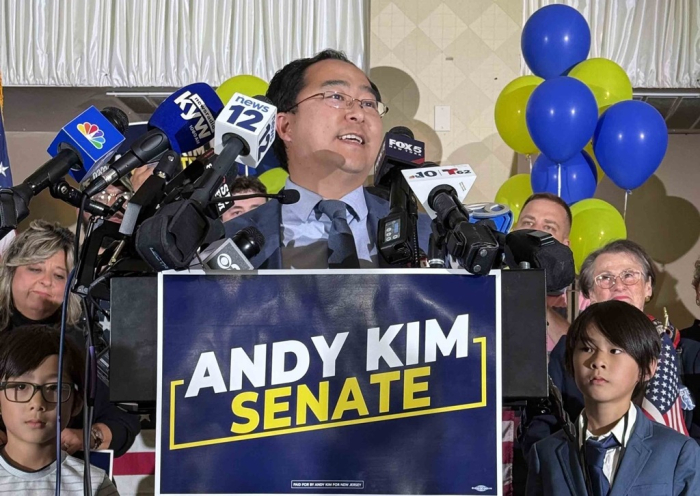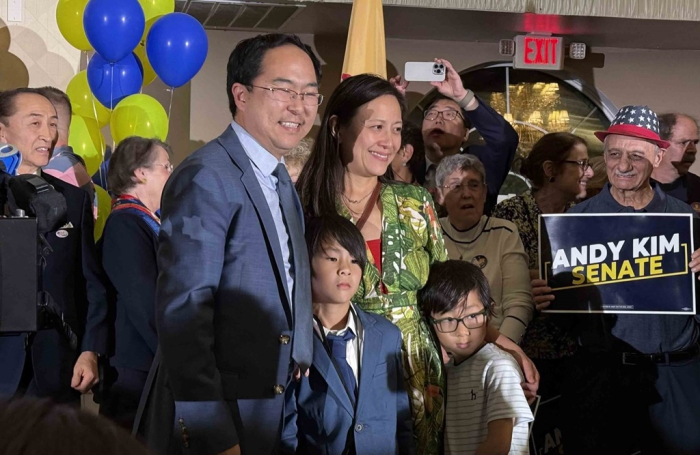
NEW YORK – Democratic US Representative Andy Kim, the first Korean-American elected to the US Senate, pledged to strengthen the relationship between Seoul and Washington.
Kim, a three-term congressman from central New Jersey, on Tuesday defeated Republican businessman Curtis Bashaw for the seat that opened when former Senator Bob Menendez resigned this year after his federal conviction on bribery charges.
“I want to contribute to strengthening US-Korea relations,” Kim told South Korean journalists in the US after winning the state’s Senate race. “There is a lot more we can do together in semiconductor manufacturing, artificial intelligence and other areas where we think Korea is at the forefront.”
South Korea’s economy is expected to lose momentum further following Donald Trump’s victory in the US presidential election as he vowed to pursue a highly protectionist trade policy and scrap or reduce subsidies for electric vehicles and semiconductors during his campaign.
The Asian country is home to the world’s two largest memory chipmakers – Samsung Electronics Co. and SK Hynix Inc. The world’s third-largest automaker Hyundai Motor Group, which includes major EV makers Hyundai Motor Co. and Kia Corp., as well as leading EV battery manufacturers such as LG Energy Solution Ltd. are headquartered there.
FIRST KOREAN-AMERICAN SENATOR IN OVER 120 YEARS
Kim is the first Korean-American elected to the Senate in over 120 years since Koreans began immigrating to the US. He is also New Jersey’s first Asian American senator.
“In American history, out of the roughly 600 million people who have been called Americans, only about 2,000 have had the privilege to serve in this capacity. In the 120-year history of Korean Americans, I am fortunate to have this opportunity,” Kim told supporters at a DoubleTree Hotel in Cherry Hill, New Jersey. He vowed to “add a new chapter to history that has yet to be written.”
Kim, a son of South Korean immigrants, grew up in South Jersey. He earned a Ph. D in international relations at Oxford after graduating from the University of Chicago.

The 42-year-old former Obama administration national security aide was first elected to Congress in 2018 by defeating Republican Tom MacArthur, an ally of Trump.
He gained national attention in 2021 when he was spotted cleaning up the U.S. Capitol after the Jan. 6 insurrection, bagging trash.
TOUGH TIMES DURING CAMPAIGN
Kim faced some tough times due to his ethnicity during the latest campaign.
“Last year, when I first started running for Senate, I had somebody literally tell me to my face that I’m the ‘wrong kind of minority to win statewide,’” Kim told US NBC News. “That was really hurtful.”
“I have every bit as much right to represent the state as anybody else. I am as American as anybody else, he emphasized, adding he hopes more Asian Americans will take the leap into public service.
A podcaster took a jab at Kim’s Korean heritage, even causing his opponent Bashaw to quickly denounce the comments and defend him as a “good man and a patriotic American who has dedicated much of his life to public service.”
Kim pledged to build a new era of politics.
“There’s no doubt a new era of politics is beginning. The old ways are over. We didn’t just run a campaign, we built a movement to fix broken politics,” he told his supporters. “Election day is not the finish line. It’s the starting point.”
By Sin-Young Park
nuysos@hankyung.com
Jongwoo Cheon edited this article.














